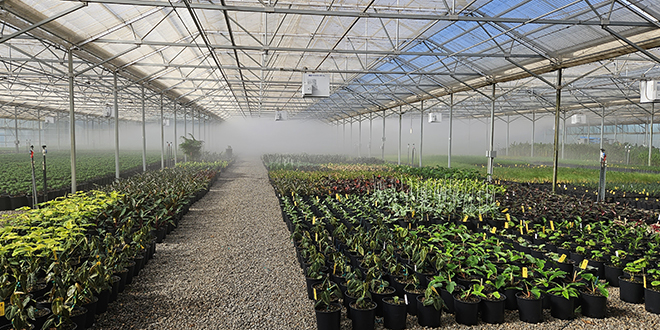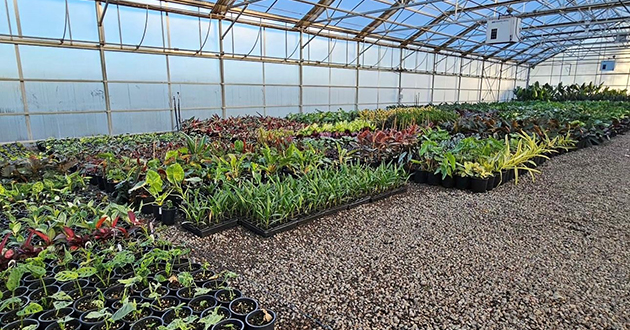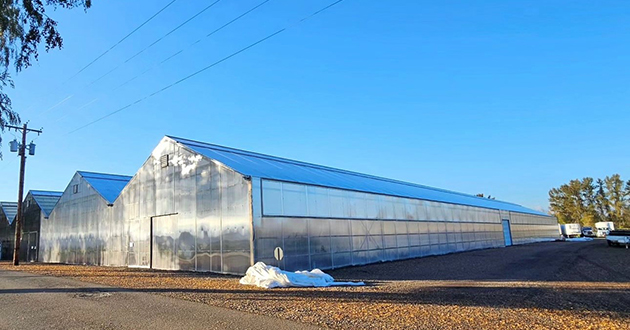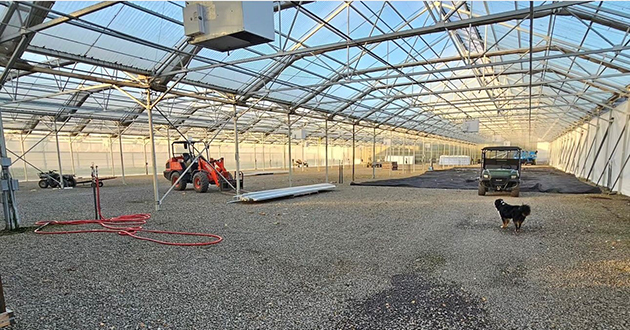Youngblood Nursery Inc. in Salem has grown and sold ornamental shrubs and trees to nurseries and landscapers since Don and Jeanne Youngblood and their son Troy founded the business in 1990. Recently, Troy Youngblood decided to expand and include rare tropical houseplants. An unexpectedly large spike in energy use led the nursery to upgrade its greenhouse glazing with incentive support from Energy Trust of Oregon.
In 2023, the nursery started building up a supply of tropical plants in a nearly two-acre greenhouse. These varieties must be kept at a minimum 70-degrees with high humidity levels to thrive. Youngblood knew these changes would increase energy use. They were surprised by just how much when representatives from NW Natural came by to investigate if a possible gas leak was causing the unusual surge in their gas usage.
Based on recommendations from other growers, Youngblood reached out to Energy Trust to learn more about options for improving energy efficiency and lowering costs in the single-glazed greenhouse. After talking with a few contractors about a range of materials, he decided on a triple wall polycarbonate exterior upgrade.
Youngblood worked with Brooks Greenhouse Construction, the contractor who originally built the greenhouse, to purchase and install the triple wall polycarbonate. The project cost of $393,000 included labor and 100,000 square feet of material to cover the greenhouse. Energy Trust provided $162,000 in cash incentives.
“We did this large-scale project out of our own working capital,” said Youngblood. “The incentive from Energy Trust meant we could consider doing the project, and complete it without a huge loan.”
Triple wall polycarbonate has three layers of material with air space between each layer, which keeps warmth inside the greenhouse longer while letting in plenty of light for healthy plants. In addition to protecting the plants, this improved insulation helps reduce energy use and costs. The new greenhouse shell is estimated to save 54,000 therms annually.
“We are running a business, so costs matter,” said Youngblood. “Our tropical plants can range from $50 to $200 each wholesale, with really special ones up in the thousands of dollars. Multiplied by a few acres of plants, that’s a lot of money. We need to do all we can to manage costs, protect the plants and promote growth.”
Youngblood noticed how much better the greenhouse held heat on the coldest nights right from the start. Now he’s talking with Energy Trust about cash incentives for high-efficiency heater upgrades that will further improve energy savings. Youngblood is also considering heat retention curtains. Further down the line, if the tropical houseplant business really takes off, he’ll look into upgrading the covering on a second, smaller greenhouse.
In addition to lowering his operational energy use, Youngblood sees other opportunities related to his expanded business. For one, the nursery has hired more staff and spent hundreds of thousands of dollars locally on plant starts and supplies. “There are environmental benefits too,” Youngblood said. “Many rare tropical plants sold in the U.S. come from Florida and overseas. By growing and supplying full-size plants in local markets, we’re helping reduce shipping miles, and the related costs of fuel, drivers and carbon emissions.”
If you’re interested in learning more about cash incentives for greenhouse and nursery upgrades, contact Energy Trust at 1.866.202.0576 or email production@energytrust.org.




